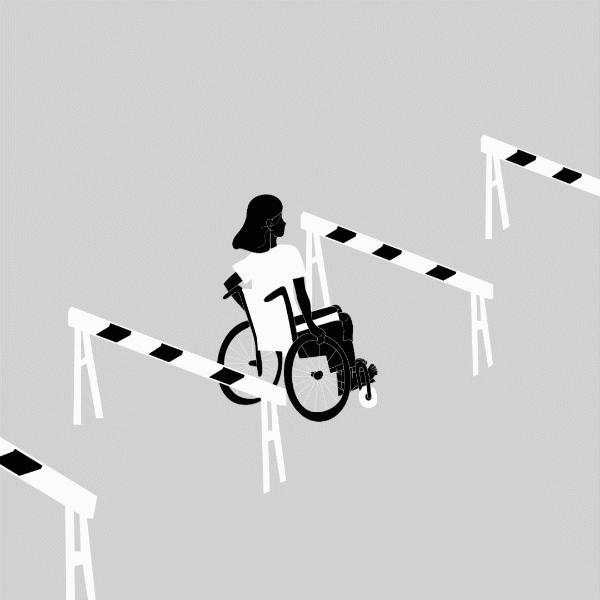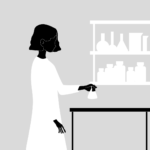WE NEED TO BE CONSCIOUS!
In Kosovë, the way people with disabilities are treated and the conditions offered are difficult. So, a 52-minute walk highlights many difficulties that people with disabilities, especially those in wheelchairs, can face.

Illustration: Argjira Kukaj
The distance between “Kodra e Trimave” neighborhood and “Gjin Gazulli” school, is about 5.7 kilometers. Walking on the sidewalks is difficult. Analyzing the road infrastructure of the capital
while keeping in mind the difficulties for the movement of the people in wheelchairs, it turns out that they face so many problems. As soon as you leave the house, on “Dalip Alshiqi” street, you see a 10 cm high sidewalk which prevents free movement. A little further there is a 50 cm wide box of electricity right in the middle of the street. At the end of “Dalip Alshiqi” street and at the entrance of “Mon Balaj” street, the highway that connects Prishtina with Podujeva, we see a long column of cars parked on the sidewalk, near the premises. A person in a wheelchair is forced to make his/her journey on asphalt, where many cars exceed the speed limit. At the entrance to the place called “Xhamia e Llapit”, “Ilir Konushevci ” street, the journey becomes more difficult. Here in this place, the sidewalk is getting narrower and narrower. Concrete pillars have been placed on this road to prevent car parking, but to no avail, they have been damaged or removed. In the “Dr. Shpetim Robaj ” street that connects the capital with Gërmia park, we also have a difficult traffic situation. There are a number of parked cars. Every day is the same situation.
In Kosovë, the way people with disabilities are treated and the conditions offered are difficult. So, a 52-minute walk highlights many difficulties that people with disabilities, especially those in wheelchairs, can face. Unfortunately, this situation is due to the negligence of the institutions to make the change, as well as the lack of general awareness on these issues. Such infrastructure, without thinking about all categories, groups of society neglecting one community to another, contributes to many aspects that make their life even more difficult. This then leads to the impossibility of being present in school, as an elementary right for everyone without distinction.
“Gjin Gazulli” high school is three floors high. About 900 students attend this school. Schools are limited in having adequate infrastructure for these persons. This school offers access to education for this community, only on the first floor. Teaching cannot be held on other floors. The professor, who belongs to this community, has been assigned a special class to practice her profession. She has access in the school through ramps for people with disabilities known as “wheelchair ramps”. Circumstances for this vehicle are not mandatory on other floors in the school.
In the press release from UNICEF, “Estimated 38,000 children with disabilities in Kosovo are not attending school” dated July 25, 2019 in terms of education for the whole country, it appears that most of these people do not go to school. According to the survey, out of 43,000 children with special needs, only 5,300 attend regular public schools in Kosovo. Meanwhile, another 38,000 children have been left out of school for various reasons.
Authorities need to step up efforts to effectively integrate children with disabilities into educational institutions and take their needs into account throughout their education. Also in terms of health, they face poor rehabilitation services, unaffordable treatment costs and attitudes of discriminatory practices. The lack of qualified persons to provide specialized service and the lack of dedicated equipment to facilitate their livelihood is clearly noticed. These roles are performed mainly by family members.
In addition to the help that institutions should provide to this category, we can also give our contribution, being conscious. We should always treat people with disabilities as equals. Everyone wants to have friends and fun. People with disabilities are no exception. You should always ask them before you help them. People with disabilities have different levels of independence.
Do not assume whether or not someone is disabled. Everyone is different.
About the author: Alban Alshiqi, 17 years old from Prishtina, attends classes at the electronic high school “Gjin Gazulli”.
This grant is supported by the Balkan Trust for Democracy, a project of the German Marshall Fund of the United States


This was a actually pretty great publish. In theory I’d like to write like this also – getting time and actual effort to make a good piece of writing but what can I say I procrastinate alot and by no means seem to obtain anything done.